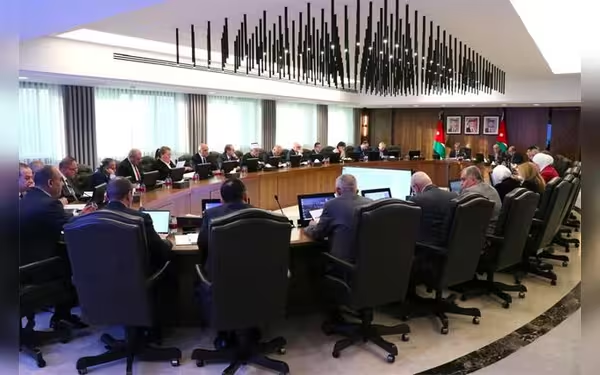Saturday, November 16, 2024 09:24 PM
Jordan Cabinet Approves Economic Modernisation and Public Sector Reforms
- Cabinet approves amendments to empower small enterprises.
- New institute to promote cooperative management training.
- Agricultural workers to receive social security benefits.
 Image Credits: menafn
Image Credits: menafnJordan's Cabinet approves key reforms for economic modernisation and public sector improvements, focusing on job creation and cooperative development.
The recent decisions made by the Cabinet of Jordan, led by Prime Minister Jafar Hassan, mark a significant step towards enhancing the country's economic landscape and modernizing the public sector. These decisions are part of the broader Economic Modernisation Vision (EMV) aimed at fostering growth and creating job opportunities, particularly for the youth and those in the agricultural sector.
One of the key highlights of the Cabinet's session is the approval of draft amendments to the Cooperation Law for 2024. These amendments are designed to empower small- and medium-sized enterprises, especially in agriculture, which is a vital sector for Jordan's economy. By establishing a Cooperative Development Fund, the government aims to support cooperative projects, ensuring that they receive the necessary funding and guarantees. This initiative is expected to stimulate job creation and enhance productivity within the agricultural community.
Furthermore, the Cabinet has proposed the creation of a Cooperative Development Institute. This institute will play a crucial role in promoting cooperative principles and providing training for individuals involved in cooperative management. By equipping national cadres with the right skills, the government is taking proactive steps to ensure the sustainability and success of cooperative enterprises.
In addition to these measures, the Cabinet has also approved amendments to the Agricultural Workers' Bylaw for 2024. These amendments aim to include all agricultural workers under social security provisions, ensuring that they have equal rights to benefits such as annual and sick leaves, maternity leaves, and fair working conditions. This move is a significant step towards improving the welfare of workers in the agricultural sector, which has often been overlooked.
Moreover, the Cabinet's decision to provide electricity to the Fish Farming Project in Al Jafer is another positive development. This project, which is part of a Royal initiative, aims to enhance the aquaculture sector and create more job opportunities in the region.
On the international front, the Cabinet has approved a memorandum of understanding with Indonesia's Ministry of Religious Affairs. This agreement is set to strengthen educational cooperation between the two countries, facilitating the exchange of knowledge, expertise, and scholarships. Such collaborations are essential for fostering a global perspective among students and educators alike.
The Cabinet's recent decisions reflect a commitment to modernizing Jordan's economy and public sector. By focusing on cooperative development, worker rights, and international collaboration, the government is laying the groundwork for a more prosperous future. These initiatives not only aim to create jobs but also to empower individuals and communities, ensuring that the benefits of economic growth are shared widely. As these plans unfold, it will be crucial for all stakeholders to work together to achieve the desired outcomes, ultimately leading to a stronger and more resilient Jordan.













